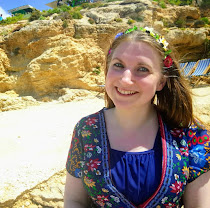For the last segment of my interview with Rianne, we discussed travel and COVID measures. It was interesting to hear about what initiatives are in place to support local business and what it's like to travel independently. It became more conversational towards the end when we contemplated the travel possibilities in a future where COVID-19 doesn't threaten us the way it does today.
Note: If you'd like to listen to/watch the entire interview, click here: https://www.youtube.com/watch?v=ZZ-iJpXWprg
Mariya: I remember you were travelling mostly on your own last summer. What was that like? Did you find it easier or more difficult to do certain things because of it?
Rianne: I mostly travel by myself anyway just because a lot of my friends have already settled down, married, had kids, all my closest friends anyway. So normally, when I'm travelling with someone, it's with my mom or sister; otherwise, I would go by myself. I kind of prefer it, I think, because you get to do exactly what you want; you don't have to compromise at all. You can be completely selfish. You can go and do and see everything you want. And if you want to, you can always meet people along the way, which is why I stay in hostels because I do want to meet people. So when you do want company, you can have company, and when you want your own space, you can just go and do your own thing.
M: You would probably recommend it to others?
R: Absolutely! I think it's empowering to do at least once in your life!
M: My only experience with that was when I did a program in Israel. It was a work-abroad program over the summer. I took the flight over there on my own pretty much, but I was with other people in the program when I was there, but there were opportunities for day trips and things like that. So I went to Jerusalem, to the Old City. I walked there on my own, and that was an experience unlike anything I've ever had. It does not compare to when I went there with a group of people and we were all crowding to take a picture, and we were kind of rushed like, "OK, great, you got to see it, let's go!" I got to really take it in and take my time with it. That is a nice thing about being on your own is you set your own schedule.
R: Definitely. And I think you learn more about yourself! You discover who you really are. The only downside for me is that sometimes you might go places and people that you're in a hostel with might not want to know you [laughs]. Then it can get lonely, but if you choose to make the effort, there's at least one person who will talk to you.
M: And I'm really glad you made the effort with me!
R: Yeah! I just wish we got to spend more time together. But we'll just have to travel and meet up somewhere again.
M: Exactly! It'll happen someday again. So speaking of travel, since COVID has happened, it’s obviously been much more difficult to do that. I am also someone who is very much full of “wanderlust.” How has England, and your hometown specifically, been affected?
M: What have you done (other than working) to keep busy, take care of yourself, and feel connected to people?
R: For myself, I've been going on a lot of walks. I've noticed that I've been stress eating more than normal and baking, having lots of goodies. And I haven't really been working out like I normally would, so that's really kind of affected me. I didn't think it would, but I always feel better when I work out. So I'm like, "OK, now I need to not just walk, I do need to work out a bit more." So I've started doing that, but only recently. I just feel like I need to do that because I've gotten so lazy watching so much Disney+ [laughs]. I don't know if it's the same in America, but probably. I just heard on the news today that 12 million people, something like that, signed up to a streaming service they weren't signed up to before, which doesn't surprise me really because when we were completely locked down, there's only so much you can do at home.
M: Yeah, it really makes you value entertainment a lot more than you may have realized.
R: And to kind of keep sane before we were allowed to venture out and see people, I was having regular video calls with friends, even like groups of friends. So that we could have "girly nights" because me and my friends normally get together for a girls night, so we're just doing them virtually. It was nice because we kind of put in more effort because we needed each other. Everyone's going through the same thing, and we wanted to be there [for each other] as much as possible even if it's just over video. But now we are able to meet up with people again. We still have to be socially distant, but I think at the moment we only have to be 1 meter (3 feet) apart. So I have met up with a few groups of friends for picnics and walks and things like that.
M: Would you consider visiting the US again when it’s safe to do so? Where would you want to go and why?


